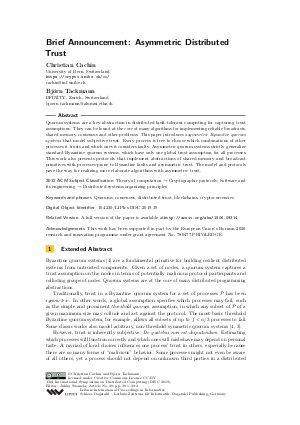Brief Announcement: Asymmetric Distributed Trust
Authors Christian Cachin, Björn Tackmann
-
Part of:
Volume:
33rd International Symposium on Distributed Computing (DISC 2019)
Part of: Series: Leibniz International Proceedings in Informatics (LIPIcs)
Part of: Conference: International Symposium on Distributed Computing (DISC) - License:
 Creative Commons Attribution 3.0 Unported license
Creative Commons Attribution 3.0 Unported license
- Publication Date: 2019-10-08
File

PDF
LIPIcs.DISC.2019.39.pdf
- Filesize: 347 kB
- 3 pages
Document Identifiers
Related Versions
-
A full version of the paper is available athttp://arxiv.org/abs/1906.09314.
Subject Classification
ACM Subject Classification
- Theory of computation → Cryptographic protocols
- Software and its engineering → Distributed systems organizing principles
Keywords
- Quorums
- consensus
- distributed trust
- blockchains
- cryptocurrencies
Metrics
- Access Statistics
-
Total Accesses (updated on a weekly basis)
0Document
0Metadata
Abstract
Quorum systems are a key abstraction in distributed fault-tolerant computing for capturing trust assumptions. They can be found at the core of many algorithms for implementing reliable broadcasts, shared memory, consensus and other problems. This paper introduces asymmetric Byzantine quorum systems that model subjective trust. Every process is free to choose which combinations of other processes it trusts and which ones it considers faulty. Asymmetric quorum systems strictly generalize standard Byzantine quorum systems, which have only one global trust assumption for all processes. This work also presents protocols that implement abstractions of shared memory and broadcast primitives with processes prone to Byzantine faults and asymmetric trust. The model and protocols pave the way for realizing more elaborate algorithms with asymmetric trust.
Cite As Get BibTex
Christian Cachin and Björn Tackmann. Brief Announcement: Asymmetric Distributed Trust. In 33rd International Symposium on Distributed Computing (DISC 2019). Leibniz International Proceedings in Informatics (LIPIcs), Volume 146, pp. 39:1-39:3, Schloss Dagstuhl – Leibniz-Zentrum für Informatik (2019)
https://doi.org/10.4230/LIPIcs.DISC.2019.39
BibTex
@InProceedings{cachin_et_al:LIPIcs.DISC.2019.39,
author = {Cachin, Christian and Tackmann, Bj\"{o}rn},
title = {{Brief Announcement: Asymmetric Distributed Trust}},
booktitle = {33rd International Symposium on Distributed Computing (DISC 2019)},
pages = {39:1--39:3},
series = {Leibniz International Proceedings in Informatics (LIPIcs)},
ISBN = {978-3-95977-126-9},
ISSN = {1868-8969},
year = {2019},
volume = {146},
editor = {Suomela, Jukka},
publisher = {Schloss Dagstuhl -- Leibniz-Zentrum f{\"u}r Informatik},
address = {Dagstuhl, Germany},
URL = {https://drops.dagstuhl.de/entities/document/10.4230/LIPIcs.DISC.2019.39},
URN = {urn:nbn:de:0030-drops-113460},
doi = {10.4230/LIPIcs.DISC.2019.39},
annote = {Keywords: Quorums, consensus, distributed trust, blockchains, cryptocurrencies}
}
Author Details
Acknowledgements
This work has been supported in part by the European Union’s Horizon 2020 research and innovation programme under grant agreement No. 780477 PRIViLEDGE.
References
- Christian Cachin and Björn Tackmann. Asymmetric Distributed Trust. e-print, arXiv:1906.09314 [cs.DC], 2019. URL: http://arxiv.org/abs/1906.09314.
- Christian Cachin and Marko Vukolic. Blockchain Consensus Protocols in the Wild. In Andréa W. Richa, editor, Proc. 31st Intl. Symposium on Distributed Computing (DISC 2017), volume 91 of Leibniz International Proceedings in Informatics (LIPIcs), pages 1:1-1:16, 2017. URL: https://doi.org/10.4230/LIPIcs.DISC.2017.1.
-
Martin Hirt and Ueli Maurer. Player Simulation and General Adversary Structures in Perfect Multi-Party Computation. Journal of Cryptology, 13(1):31-60, 2000.

-
Dahlia Malkhi and Michael K. Reiter. Byzantine quorum systems. Distributed Computing, 11(4):203-213, 1998.

- David Mazières. The Stellar Consensus Protocol: A Federated Model for Internet-level Consensus. Stellar, available online, https://www.stellar.org/papers/stellar-consensus-protocol.pdf, 2016.
